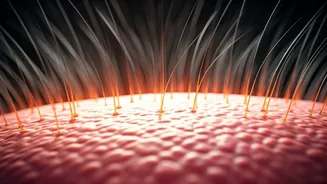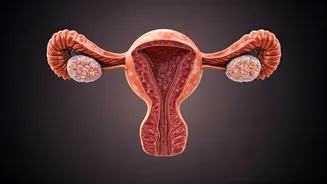Genetic Predisposition Explained
The question of whether hair loss originates from the paternal or maternal side has intrigued many. Research indicates that the genes responsible for balding
can be inherited from either parent. This means the predisposition for hair loss isn't limited to one side of the family. The specific genes involved, as well as the extent and timing of hair loss, can vary greatly. Several genes play a role in hair loss, and their expression can differ. Environmental factors and lifestyle choices can also affect how these genes behave. Family history serves as a key indicator of potential hair loss patterns. The presence of balding relatives increases an individual's likelihood of experiencing hair thinning or loss. Understanding one's family history becomes essential for anticipating and addressing hair loss concerns proactively.
Lifestyle's Impact on Hair
Lifestyle choices greatly influence hair health, with various factors contributing to hair fall. Poor nutrition, especially a deficiency in essential vitamins and minerals, can weaken hair follicles and promote shedding. Stress also plays a significant role, as it can disrupt the hair growth cycle, leading to increased hair loss. Certain hairstyling practices, such as tight braids or excessive heat styling, can damage hair and cause breakage. Additionally, exposure to environmental pollutants and chemicals in hair products can negatively impact hair health. Addressing these lifestyle factors is key to promoting healthy hair. A balanced diet rich in vital nutrients, effective stress management techniques, and gentler hair care practices can positively affect hair health, reducing hair fall and encouraging growth.
Identifying Inflammation's Signs
While the provided text primarily addresses hair fall and its causes, it's worth noting that the article mentions signs indicating inflammation. Although a full analysis of gut inflammation is outside the scope, the presence of inflammation in the body, even beyond the gut, can manifest as a multitude of symptoms. These may include skin rashes, fatigue, and other systemic issues. Inflammation can affect the body's overall health and have indirect effects on hair health. While gut inflammation is not the primary topic, it is good to remain aware that inflammation can have broader implications. It's often linked to dietary choices and can potentially impact hair. Recognizing these signs and adopting a holistic health approach may help in managing hair loss effectively.
Solutions for Healthy Hair
Addressing hair fall necessitates a multifaceted approach that combines both lifestyle adjustments and specific treatments. Ensuring a balanced diet, abundant in vitamins, minerals, and antioxidants, is crucial for promoting hair health. Managing stress through practices like yoga or meditation can positively influence the hair growth cycle. Choosing gentle hair care practices, such as avoiding harsh chemicals and heat styling, helps prevent damage and breakage. Several treatments, including topical medications and hair restoration procedures, can also be beneficial in managing hair loss. Consulting with a dermatologist or hair specialist is important. They can perform an accurate diagnosis to identify the root cause of hair fall. Through this they can develop a customized treatment plan, tailored to the individual's specific needs, and improve overall hair health.













